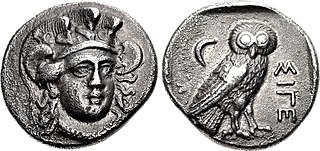Related Research Articles
Year 341 BC was a year of the pre-Julian Roman calendar. At the time it was known as the Year of the Consulship of Venno and Privernas. The denomination 341 BC for this year has been used since the early medieval period, when the Anno Domini calendar era became the prevalent method in Europe for naming years.

Demosthenes was a Greek statesman and orator of ancient Athens. His orations constitute a significant expression of contemporary Athenian intellectual prowess and provide an insight into the politics and culture of ancient Greece during the 4th century BC. Demosthenes learned rhetoric by studying the speeches of previous great orators. He delivered his first judicial speeches at the age of 20, in which he argued effectively to gain from his guardians what was left of his inheritance. For a time, Demosthenes made his living as a professional speech-writer (logographer) and a lawyer, writing speeches for use in private legal suits.
This article concerns the period 349 BC – 340 BC.
Year 344 BC was a year of the pre-Julian Roman calendar. At the time it was known as the Year of the Consulship of Rutilus and Torquatus. The denomination 344 BC for this year has been used since the early medieval period, when the Anno Domini calendar era became the prevalent method in Europe for naming years.

Aeschines was a Greek statesman and one of the ten Attic orators.
A philippic is a fiery, damning speech, or tirade, delivered to condemn a particular political actor. The term is most famously associated with two noted orators of the ancient world: Demosthenes of ancient Athens and Cicero of ancient Rome. The term itself is derived from Demosthenes' speeches in 351 BC denouncing the imperialist ambitions of Philip of Macedon, which later came to be known as The Philippics.
Diopeithes was an Athenian general, probably father of the poet Menander, who was sent out to the Thracian Chersonese about 343 BC, at the head of a body of Athenian settlers or cleruchs.

Chares of Athens was a 4th-century BC Athenian military commander (Strategos), who for a number of years was one of Athens's foremost commanders. He was also a well connected politician enabling him to procure the commands he desired, commands he primarily used to enrich himself and his adherents.
Callias of Chalcis, son of Mnesarchus, together with his brother Taurosthenes, succeeded his father as tyrants of Chalcis. Callias formed an alliance with Philip of Macedon against Plutarch, tyrant of Eretria, with the view of extending his authority over the whole of Euboea, a design which, according to Aeschines, he disguised as a plan for uniting in one league the states of the island and establishing a general Euboean congress based at Chalcis.
Cleitarchus or Clitarchus was tyrant of Eretria in Euboea.
The Olynthiacs were three political speeches, all delivered by the Athenian statesman and orator Demosthenes. In 349 BC, Philip II of Macedon attacked Olynthus, which at the time was an ally of Athens. In the Olynthiacs, delivered in 349 BC, Demosthenes urged Athens to help Olynthus.
The "First Philippic" was delivered by the Athenian statesman and orator Demosthenes between 351 BC-350 BC. It constitutes the first speech of the prominent politician against Philip II of Macedon.
The "Second Philippic" is an oration that was delivered by the Athenian statesman and orator Demosthenes between 344–343 BC. The speech constitutes the second of the four philippics the orator is said to have delivered.
Peace of Philocrates is the name given to the peace treaty concluded in 346 BC between Athens and Macedon under Philip II. Philocrates was the name of the main Athenian negotiator of the Treaty.
The "Third Philippic" was delivered by the prominent Athenian statesman and orator, Demosthenes, in 341 BC. It constitutes the third of the four philippics.
"On the Chersonese" is a political oration delivered by the Athenian statesman and orator Demosthenes in 341 BC. A short time later Demosthenes delivered one of his most famous speeches, the Third Philippic.
"On the False Embassy" is the name of two famous judicial orations, both delivered in 343 BC by the prominent Athenian statesmen and fierce opponents, Demosthenes and Aeschines.
Euphraeus was a philosopher and student of Plato from the town of Oreus in northern Euboea. He appears to have been active in politics in addition to his speculative studies, being first an adviser to Perdiccas III of Macedon and then an opponent of Philip II and his supporters in Oreus. Information regarding his life is scant, however, and few facts about it are mentioned in more than one source. He appears in the Fifth Letter of Plato, Demosthenes' Third Philippic, and Athenaeus' Deipnosophistae.

The Philippics are a series of 14 speeches composed by Cicero in 44 and 43 BC, condemning Mark Antony. Cicero likened these speeches to those of Demosthenes against Philip II of Macedon; both Demosthenes’s and Cicero's speeches became known as Philippics. Cicero's Second Philippic is styled after Demosthenes' De Corona.

Under the reign of Philip II, the kingdom of Macedonia, initially at the periphery of classical Greek affairs, came to dominate Ancient Greece in the span of just 25 years, largely thanks to the personality and policies of its king. In addition to utilising effective diplomacy and marriage alliances to achieve his political aims, Philip II was responsible for reforming the ancient Macedonian army into an effective fighting force. The Macedonian phalanx became the hallmark of the Macedonian army during his reign and the subsequent Hellenistic period. His army and engineers also made extensive use of siege engines.
References
- 1 2 3 Henderson 1930, pp. 268–9.